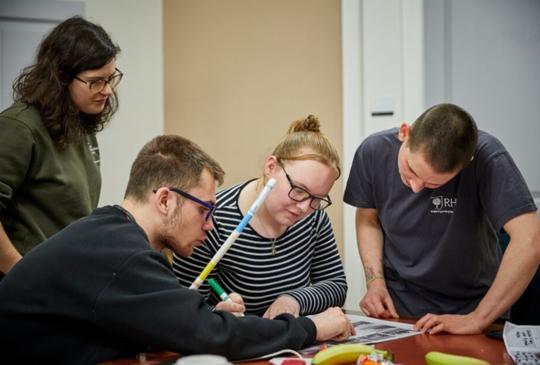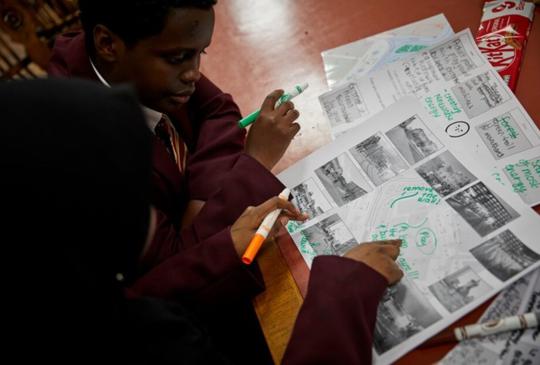
The IGNITION Project: How We’re Getting People Switched On to Climate Change
Contributed by Jennifer Lane
The IGNITION project started in 2019, bringing together 12 partners from Greater Manchester’s local government, universities, non-governmental organisations and businesses.
The project partners aim to address the climate emergency. We are currently investigating how to fund the delivery of more nature-based projects that will help make us less vulnerable to climate change. We aim to achieve a 10% increase in our city’s coverage of trees and green space by 2038.
 The RHS, City of Trees and Groundwork have linked up with groups of citizens across Greater Manchester through a series of workshops designed to explore how they value the city’s parks, woodlands and other greenspaces. To date, we have facilitated over 20 workshops with more than 250 participants, countless ideas, and scores of innovations. Groups of young people involved in Greater Manchester’s Youth Councils, National Citizen Service, The Proud Trust, and other organisations have been particularly active in exploring how plants and trees can be used to transform their urban environment.
The RHS, City of Trees and Groundwork have linked up with groups of citizens across Greater Manchester through a series of workshops designed to explore how they value the city’s parks, woodlands and other greenspaces. To date, we have facilitated over 20 workshops with more than 250 participants, countless ideas, and scores of innovations. Groups of young people involved in Greater Manchester’s Youth Councils, National Citizen Service, The Proud Trust, and other organisations have been particularly active in exploring how plants and trees can be used to transform their urban environment.
During the workshops, participants have thought up wonderfully creative ways of using plants and trees to redesign urban spaces. Primed with freshly decorated gingerbread people, conversations between participants wandered seamlessly from drone-pollinated plants, to the merits of a well-constructed, Instagrammable flower wall, and then, naturally, on to the intricacies of capturing rainwater to water rooftop vegetables. Some of these ideas may seem fantastical, farfetched and even impossible, but all of them offer potential new avenues to explore as we look to reimagine city spaces to tackle the effects of climate change, and make space for wildlife and people.
 How do we speak about the environment?
How do we speak about the environment?
Groups have scrutinised the vocabulary used when talking about climate change and the natural environment: asking questions like ‘What is a greenspace?’ commonly lead to more questions, such as:
- ‘Should they be free?’
- ‘Do green walls count?’
- ‘Can I sit in them?’
- ‘How big are they?’
- ‘Are they open all the time?’
- ‘Do they even have to be green?’
Discussions like this encourage us to re-examine the meaning of these words in the context of today’s urban environment, and allow us to select the right language when communicating new concepts and project ideas.
Workshop participants well and truly dissected the connections between urban greening and climate change, wildlife, and human health and wellbeing. People recalled the particulars of their favourite greenspaces that were personal to them and swapped tips on local places to visit. Many groups were in agreement that well-designed, constructed and maintained patches can benefit wildlife and people alike. One member got very animated about the qualities of the perfect skate ramp, and another when describing their experience of harvesting the first crop of vegetables from their allotment. Others were keen to learn more about greening their own neighbourhood through tree planting, renovating neglected spaces, retrofitting small-scale green roofs, and generally spreading the word about urban greening.
Transforming the city
The information gathered from all the workshops will be used to determine how the IGNITION project can fund the delivery of more nature-based projects that will help make us less vulnerable to climate change, and transform our city into resilient, healthy and beautiful place to live.
Over the course of the next two years, RHS, City of Trees and Groundwork will continue to work with groups of citizens from across Greater Manchester to support those that would like to be involved in transforming our city. Opportunities will include: visiting RHS Garden Bridgewater and the Living Lab at Salford University to learn more about what makes a resilient greenspace, helping groups to develop their own greenspaces or initiatives, and information about the development of the Ignition Project, and other related urban greenspace projects.
If you have not had the opportunity to participate in a workshop, you can share your thoughts with us by filling in this short survey.
If you’d like more information about the IGNITION project, head over to the RHS Bridgewater site.

Contributor Profile
Jennifer Lane is Campaign Manager for the IGNITION Project and Natural Course.

